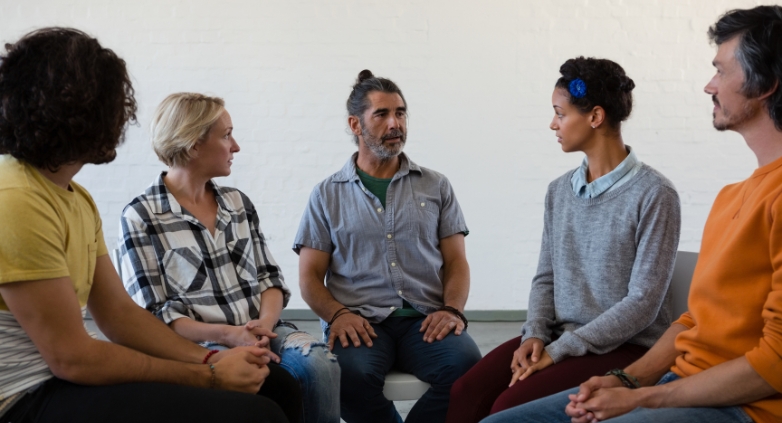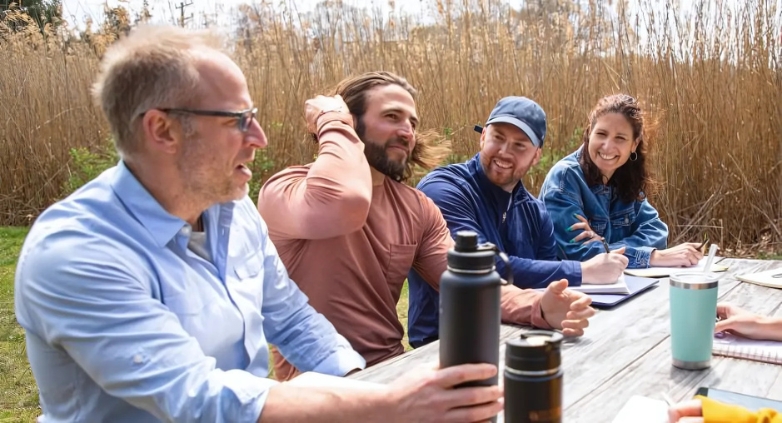
What Resources Are Available for Families of Addicts?
When a loved one is battling addiction, the whole family feels the impact.
You don’t have to face this challenge alone—there are numerous support options available to help you navigate this difficult journey and prioritize your well-being.
This guide highlights crucial resources for families dealing with addiction, providing actionable steps to foster healing and resilience:
- Support Groups: Places like Al-Anon and Nar-Anon offer peer support.
- Educational Resources: Books, articles, and online programs.
- Family Counseling: Professional help to rebuild trust and improve communication.
- Individual Counseling: Develop personal coping strategies.
- Virtual Therapy Options: Flexible online counseling sessions.
- In-Home Recovery Services: Professional care in the comfort of your home.
- Intensive Outpatient Programs (IOP): Treatment that allows living at home.
- Community-Based Programs: Local and faith-based support.
- Virtual Support Groups: Online meetings for guidance and peer support.
- Telehealth Counseling: Remote access to therapy and educational programs.
- Online Communities and Forums: Anonymous platforms for advice and connection.
- Project Courage’s Virtual Services: Online support for families and individuals.
By understanding the resources available in Connecticut, you can play an active role in your loved one’s recovery while also taking care of your own needs.
Read on to explore more about how each resource can support your journey towards recovery.

1. Support Groups for Families of Addicts
Different families have different needs, so a variety of resources exist to provide education, counseling, and peer support. Here are some of the most valuable options available.
Support groups like Al-Anon, Nar-Anon, and Families Anonymous offer a safe space for families of addicts to share experiences and gain emotional support. These groups provide peer support, stress management tools, and education on addiction, helping loved ones navigate challenges.
To get started, visit their official websites to find local or virtual meetings, check community centers, or ask treatment providers for recommendations specific to Connecticut.
2. Educational Resources
Understanding addiction is crucial for families supporting a loved one in recovery. Numerous online articles, books, podcasts, and webinars offer valuable insights into addiction science, recovery strategies, and family dynamics.
Recommended resources include “Beyond Addiction: How Science and Kindness Help People Change”, as well as websites like the National Institute on Drug Abuse (NIDA) and SAMHSA. Educating yourself helps reduce stigma, fosters empathy, and equips families with effective communication and support strategies.

3. Family Counseling
Addiction doesn’t just affect the individual, causing emotional strain and communication breakdowns. If you’re wondering, “what resources are available for families of addicts,” counseling is one of the most effective tools for healing and it helps families rebuild trust, set boundaries, and navigate recovery together.
Family therapy in Connecticut helps loved ones improve communication, rebuild trust, and establish healthy boundaries with the person in recovery.
It provides a structured environment to address past conflicts, heal emotional wounds, and develop coping strategies. Counseling sessions can also educate families on addiction, helping them support their loved one without enabling destructive behaviors.
Free Download
Proven Programs for Lasting Recovery
Receive your free guide to understanding alcohol addiction and discovering recovery programs tailored to you. Learn how to build a personal sobriety plan and get support every step of the way.
4. Individual Counseling
Addiction affects the entire family, often leading to stress, anxiety, and emotional exhaustion.
In Connecticut, individual counseling provides family members a safe space to process their feelings, build resilience, and develop healthy coping mechanisms.
This personal support is essential for maintaining emotional well-being and learning how to set boundaries while still offering meaningful support to their loved one in recovery.
5. Virtual Therapy Options
Virtual therapy makes counseling more accessible for families balancing work, childcare, and other responsibilities. Online sessions allow individuals and families to connect with licensed therapists from home, eliminating travel barriers.
This flexibility ensures that more people can receive professional support, whether through one-on-one counseling or family therapy sessions, without the added stress of scheduling conflicts.

6. In-Home Recovery Services
Project Courage’s In-Home Recovery Services (IHRS) in Connecticut and Massachusetts provide expert addiction care directly in the home, offering a personalized and convenient approach to recovery.
These services blend clinical expertise with real-life support, ensuring individuals receive structured treatment without disrupting daily routines.
Family involvement is key, as addiction affects loved ones too. Through counseling, education, and hands-on guidance, families learn how to support recovery effectively, creating a healthier, more stable home environment for long-term success.
7. Intensive Outpatient Programs (IOP)
Intensive Outpatient Programs (IOPs), like those at Project Courage, provide structured addiction treatment while allowing individuals to live at home. These programs often include family education and therapy, helping loved ones understand addiction, set healthy boundaries, and support recovery.
Family involvement strengthens communication, reduces enabling behaviors, and fosters healing for everyone affected. IOPs offer flexibility, making it easier for individuals to receive care while maintaining responsibilities like work, parenting, and household duties—ensuring recovery integrates into daily life.
8. Community-Based Programs
Families of individuals struggling with addiction can find valuable support through local recovery organizations and faith-based programs. These programs offer counseling, educational workshops, and peer support groups to help families navigate the challenges of addiction.
In Connecticut, many communities host nonprofit organizations dedicated to addiction recovery, such as Al-Anon or Nar-Anon. To find local resources, visit directories like SAMHSA’s Treatment Locator or search for faith-based programs through Connecticut churches and community centers.

9. Virtual Support Groups for Families of Addicts
For families of individuals struggling with addiction, online and virtual resources can be invaluable. Many families face emotional distress, uncertainty, and logistical challenges in supporting their loved ones.
If you’re wondering, “What resources are available for families of addicts?” The internet offers a wide range of tools and support systems that provide guidance, education, and community, all from the comfort of home.
Families of addicts in Connecticut can access virtual support groups like Al-Anon, Nar-Anon, and other online meetings designed to provide guidance and emotional support. These groups offer a safe space to share experiences, gain insight, and connect with others across the state facing similar challenges.
Virtual sessions are convenient and accessible from anywhere, making them ideal for busy schedules. Many organizations provide free or low-cost meetings via Zoom or other platforms, ensuring families receive support without financial barriers.
10. Telehealth Options for Family Counseling
Virtual counseling is transforming how families support loved ones through addiction recovery. Telehealth options provide convenient access to professional guidance, eliminating barriers like travel time, scheduling conflicts, and stigma.
Families can engage in private therapy sessions, support groups, and educational programs from the comfort of home. These services offer flexibility and accessibility, ensuring families receive the emotional and practical support they need. As addiction affects the whole family, telehealth makes recovery resources more inclusive and effective.
11. Online Communities and Forums
Families of individuals struggling with addiction can find support through online communities and forums. Platforms like Reddit’s r/addiction and r/Al-Anon offer a space for sharing experiences and advice anonymously.
Websites such as In The Rooms and SMART Recovery Family & Friends provide structured discussions and educational resources. These forums allow family members to connect, vent, and seek guidance without stigma, making them valuable tools for emotional support and practical advice.
12. Project Courage’s Virtual Services
At Project Courage in Connecticut, we recognize that addiction impacts the entire family, not just the individual struggling with substance use.
If you’re wondering what resources are available for families of addicts in Connecticut, we offer family therapy for addiction, individual counseling for loved ones, and virtual support groups. Our services are designed to be accessible and effective, helping Connecticut families navigate recovery together.
These services ensure that families can participate in the recovery process, no matter where they are. Virtual support is also a great first step toward in-home recovery services, making it easier for families to stay involved and informed.
Looking for virtual support? Contact us today to learn more!

Understanding the Role of Families in Addiction Recovery
Addiction affects the whole family, bringing emotional stress, financial strain, and relationship challenges. But family support is key to recovery. By understanding their role and prioritizing self-care, families can create a healthy, supportive environment that fosters healing.
Why Family Involvement Matters
Addiction doesn’t just affect the individual—it impacts the entire family. Emotionally, loved ones often experience stress, guilt, anger, and fear. Mentally, they may struggle with anxiety or depression, constantly worrying about their addicted family member. Financially, addiction can lead to job loss, legal fees, or unexpected expenses, straining the household.
However, family involvement plays a crucial role in recovery. Studies show that when families engage in support groups, therapy, and education, their loved ones have higher success rates in treatment. A strong support system provides accountability, encouragement, and stability, which can make all the difference in long-term sobriety.
Key Challenges Families Face
Families of individuals struggling with addiction often experience intense emotions like guilt, frustration, and helplessness. Many blame themselves or feel responsible for their loved one’s addiction, leading to enabling behaviors—such as covering up consequences or providing financial support—that unintentionally prolong the cycle.
A lack of boundaries can further complicate relationships, making it harder to encourage recovery. Over time, emotional burnout sets in, leaving family members exhausted and overwhelmed.
Recognizing these challenges is the first step toward healing, and seeking support through counseling or support groups can provide guidance on navigating these difficulties in a healthy way.
Acknowledging the Need for Support
When a loved one struggles with addiction, families often focus all their energy on helping them recover—sometimes at the expense of their own well-being. It’s important to recognize that addiction affects the entire family, and seeking support is not a sign of weakness but of strength.
Resources like support groups for families of addicts, counseling, and educational programs can provide guidance, emotional relief, and tools to navigate this difficult journey.
Prioritizing family support creates a healthier environment for both the person in recovery and their loved ones, fostering long-term healing and stability for everyone involved.

How Families Can Take Care of Themselves
When a loved one is struggling with addiction, it’s easy for families to feel overwhelmed. Knowing what resources are available for families of addicts can help them navigate this challenging time. Support groups, counseling, and self-care practices like setting boundaries and managing stress are essential.
Prioritizing their well-being ensures they can provide the best possible support. The importance of self-care goes beyond just coping—it helps families stay resilient and emotionally strong.
The Importance of Self-Care
Supporting a loved one through addiction is emotionally and physically demanding. Families often focus so much on the person struggling that they neglect their own well-being. Prioritizing self-care—through rest, exercise, therapy, or personal hobbies—helps maintain resilience and prevent burnout.
Seeking support groups for families of addicts or counseling for families of addicts provides guidance and emotional relief, ensuring families stay strong and supportive.
Strategies for Self-Care
Caring for a loved one struggling with addiction can be emotionally exhausting. Prioritizing self-care is essential to maintaining resilience. Regular exercise helps reduce stress, while mindfulness practices like meditation or deep breathing promote emotional balance.
Journaling provides a safe space to process feelings, and staying connected with supportive friends or groups prevents isolation. Prioritizing your well-being allows you to offer more effective support.
Resources for Stress Management
Caring for a loved one with addiction can be overwhelming, making stress management essential. Meditation apps like Calm and Headspace offer guided breathing exercises to reduce anxiety.
Local wellness programs, such as yoga classes or mindfulness workshops, provide healthy coping mechanisms. Many communities also offer stress management courses tailored for families of addicts, helping them navigate emotional challenges with greater resilience.
Discover how families play a vital role in addiction recovery.

Steps to Take Today
Supporting a loved one through addiction can feel overwhelming, but taking small, intentional steps can make a difference. Start by reaching out to a local support group or joining a virtual meeting—connecting with others in similar situations can provide comfort and guidance.
Scheduling a consultation with a counselor can also offer professional insight; Project Courage provides specialized family counseling in Connecticut and Massachusetts. Lastly, share educational resources with family members to spark conversations and foster a deeper understanding of addiction and recovery.
Ready to take this step? Schedule a consultation with Project Courage today.
FAQs
One of the best first steps is seeking support. Joining a support group for families of addicts, like Al-Anon or Nar-Anon, can help you connect with others who understand your experience. Speaking with a counselor or learning more about addiction through trusted resources can also provide clarity and guidance.
Yes! Many support groups, community programs, and online resources are free. Organizations like Al-Anon, Nar-Anon, and Families Anonymous offer no-cost meetings for families. Additionally, resources like SAMHSA’s National Helpline (1-800-662-HELP) can connect you with low-cost or sliding-scale therapy options.
Absolutely. Virtual therapy and support groups provide the same level of professional guidance and peer support as in-person services—without the barriers of travel or scheduling conflicts. Many families find virtual sessions more convenient and comfortable, making it easier to stay engaged in the recovery process.
Do you have more questions?
We’re here to help. Contact Project Courage to learn more about our services, including family counseling, in-home recovery, and virtual support options. You can also visit our FAQ page for more answers
Free Download
Proven Programs for Lasting Recovery
Receive your free guide to understanding alcohol addiction and discovering recovery programs tailored to you. Learn how to build a personal sobriety plan and get support every step of the way.
Conclusion
Families don’t have to face addiction alone—there are many resources available to support both individuals struggling with addiction and their loved ones. From support groups for families of addicts to family therapy for addiction, these services provide guidance, connection, and hope. Seeking counseling for families of addicts or engaging in resources for addiction recovery can help rebuild trust, improve communication, and foster healing.
Recovery is possible, and no one has to go through it alone. With the right support, families can navigate addiction’s challenges and come out stronger together.
If you or a loved one need help, Project Courage offers in-home and virtual recovery services designed to support the entire family. Healing begins with a single step. Connect with Project Courage and find the right support for your family.


